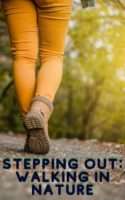From morning till night, humans are attached to their screens, whether for work, school or entertainment. How can they not when algorithms are designed to ensure we stay glued to our screens? Tiktok shows you videos based on your behaviour; YouTube recommends things they have noticed you are interested in. So the behaviour is motivated by the devices we are using as well, it is significantly worse for Gen z, who was born into the world of new technologies; that’s all they know and will ever know as it improves even more in grabbing their attention.
That’s why it is essential now more than ever to take some time away from your screen and enjoy your surroundings. It sounds very cliche but smelling the roses outside rather than the smell of your home may be what you need some days. Something about the fresh air fills your body with calm.
Hiking wasn’t a thing I thought I would enjoy doing until I realised I have always been a hiker. Every morning, before sunrise and the scheduled time for the livestock to go feed on the plains, my grandfather and I would always hike to the nearest mountain looking for firewood, or I would follow him up the hills as a mini shepherd. It was always so quiet up there, I didn’t understand then what he enjoyed so much about hiking up the mountain every morning.
Is there such a thing as nature’s healing powers?
As humans, our brains, minds, thoughts, and energy are always overworked because people have careers, relationships and families to care for. Humans are always doing something, and moments of peace are rare in a world that pushes constant action. Moments of silence, genuine silence when we can hear ourselves think, are rare because even our thoughts can be so loud and overwhelming. Taking a hike to clear your head after a stressful week can be what you need to sync back to yourself.
Hiking doesn’t just mean climbing Mount Everest; it can be taking a short walk after work to the park. Or taking a morning walk before the rush of life begins. According to Mind.org, a study of residents of Denmark, researchers used satellite data to assess people’s exposure to green space from birth to age 10. The researchers examined data from more than 900,000 residents born between 1985 and 2003. They found that children who lived in neighbourhoods with more green space had a reduced risk of many psychiatric disorders later in life, including depression, mood disorders, schizophrenia, eating disorders and substance use disorder. For those with the lowest levels of green space exposure during childhood, the risk of developing mental illness was 55% higher than for those with abundant green space.
How to use walking as a therapy to avoid making mountains out of molehills.
A 2022 study published in the International Journal of Mental Health and Addiction determined that nature therapy is an effective short-term treatment for mental health conditions, most notably anxiety. Participants experienced positive results after spending just 15 minutes outside for nine days. Researchers credit the efficacy of this treatment to the idea that being in nature allows the body to decrease its stress levels.
In her book Do Walk: Navigate earth, mind and body. Step by step, Libby DeLana shares that one morning in 2011, she stepped outside her New England home for a walk. She did the same thing the next day and the next. It became a daily habit. She reveals how walking each day provides the time and space to reconnect with the world around us; process thoughts; improve our physical well-being, and unlock creativity.
The culture of hiking is also growing in South Africa, it may be that so many people are finding that it helps them deal in different ways – and I no longer wonder why my grandfather enjoyed the silence of the mountains.
Tell us what do you do when you feeling overwhelmed with daily living?



